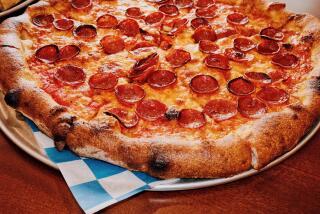Unfamiliar Name Offers Familiar Fare : Paragon Intent On Bolstering Growth
Chances are good that even people who dine out frequently wouldn’t recognize the Paragon Restaurant Group name--even though the privately held, San Diego-based company now owns 107 steak, seafood and Mexican dinner houses around the country.
But anonymity doesn’t bother Paragon executives because the company’s restaurants--including The Boathouse, Ancient Mariner, Rusty Duck, The Dock, The Whaling Company, Carlos Murphy’s, Hungry Hunter and Mountain Jack’s--generated a profit on $161 million in 1987 revenue. And, late last year, Paragon bolstered its collection of upscale dinner houses with the $46.1 million acquisition of Rusty Pelican, a 22-unit restaurant chain based in Irvine that generated $60.3 million in 1987 revenue. Rusty Pelican ended fiscal 1986, its last complete year as a public company, with a $300,000 net loss. It has since returned to profitability, according to Paragon.
With the Rusty Pelican acquisition completed, Paragon now must focus on remaining profitable in an era when margins are tightening and most of the choice expansion locations have been taken.
The company must boost sales at existing restaurants--but without the kind of price increases that would scare away blue-collar consumers that Paragon needs to augment its largely white-collar base, according to industry observers.
More Than $230 Million
The combined chains should generate more than $230 million in revenue during the fiscal year ending Oct. 31, 1988, according to Paragon Chairman Gordon Miles.
Paragon needs to boost its sales to service a debt load that was high even before Paragon tackled the $46.1 million Pelican deal. And, Paragon intends to use profits to add restaurants, including Rusty Pelican expansion into the San Fernando Valley.
Paragon was created in November, 1986, when an investor group including Miles, formerly Vicorp’s chairman, and the investment firm of Donaldson, Lufkin & Jenrette Securities completed a $98.5 million leveraged buyout of Denver-based Vicorp Restaurant’s specialty restaurant group. The deal fell together relatively quickly because Vicorp wanted to concentrate on its 170 Baker’s Inn and Village Square coffee shops while Miles wanted to stick with Vicorp’s dinnerhouse business.
Paragon’s deal for publicly traded Pelican almost fell apart in the wake of the Oct. 19 market crash. Paragon executives found themselves scrambling for new financing after the crash shattered their initial bridge financing package.
Public Offering Delayed
The crash also has forced Paragon to indefinitely delay a planned initial public offering that would have raised funds to reduce debt or finance another acquisition--and provide Donaldson, Lufkin & Jenrette and other investors a quicker return on their investment.
“I think Oct. 19 has delayed any chance for that (IPO),” Paragon President Thomas Doan acknowledged during a recent interview.
With the IPO on hold, Paragon won’t be in the market for another “huge acquisition, which is what we’d like to do,” Doan said.
Miles, industry analysts said, is the dealmaker who arranges financing and doles out available capital to Paragon’s three distinct restaurant divisions. Doan concentrates on managing the steak and beef houses, seafood restaurants and the Carlos Murphy’s chain.
Paragon will continue to add to its beef, seafood and Mexican divisions by acquiring single restaurants or small chains, Doan said. For example, Paragon two weeks ago acquired a restaurant in La Mesa that has reopened as a Hungry Hunter.
Upscale Dinner House
Rusty Pelican, a largely upscale dinner house, that attempted a costly expansion during 1984, will also grow, according to Randy Howatt, a former Rusty Pelican executive who now serves as president of Paragon’s seafood division.
But the upcoming expansion won’t mimic Rusty Pelican’s previous move into far-flung locations such as Dallas, Seattle, Kansas City and Chicago. That move dragged down Rusty Pelican’s profitability during the past three years.
“One thing Rusty Pelican learned is that putting single restaurants in around the country is an expensive way to do things,” according to Edward P. Grace III, a Providence, R.I. restaurateur who was Rusty Pelican’s second-largest shareholder. “That was just not an efficient way to go about expansion.”
Grace, who once threatened a takeover of Rusty Pelican, suggested that Doan and Miles give strong consideration to closing Rusty Pelicans in Houston, Dallas and Kansas City. “Rusty Pelican is profitable again but there is still the nagging problem of those (struggling) restaurants,” according to Grace.
The restaurants in Chicago and Seattle are doing well, but Doan acknowledged that the long-troubled Texas economy has hurt Rusty Pelican’s expansion into that state.
2 New Pelicans
Paragon, which seven restaurants in Greater Los Angeles--including Rusty Pelicans in Glendale and Long Beach--will open two new Pelicans in Encino and Woodland Hills in the San Fernando Valley during the next year, according to Howatt.
“The success of our Glendale restaurant really shouts out that we need to do more” in Los Angeles,” Howatt said. “It makes sense (for Paragon) to take advantage of economies of scale and to start penetrating Los Angeles County to a greater degree.”
Those new Rusty Pelicans--along with additional beef and Mexican dinner houses--will generate economies of scale that will help Paragon squeeze profits out of the intensely competitive dinner house segment, according to Paragon Vice President William Seckinger.
For starters, the Pelican acquisition transformed Paragon, with a total of 35 seafood restaurants, into a major West Coast fish purchaser, which should give Paragon greater buying power, according to Seckinger.
Paragon will also link Rusty Pelican into its existing point-of-sale computer system--a move that Grace described as necessary for Rusty Pelican to compete with chains already enjoy computer-generated cost controls.
Some Price Increases
Paragon will increase some menu prices--but not so much that the chain scares away the increasingly important blue collar crowd that Paragon is hoping to capture. Doan hopes that the bulk of Paragon’s revenue growth will come from increased volume at existing and new locations.
The Rusty Pelican expansion has been approved but Doan said Paragon won’t ignore its beef houses or the Carlos Murphy’s chain. Doan bristles at the suggestion that seafood is pushing beef dinners off of the table.
That strong belief in beef’s future was seconded by one restaurant critic who noted that “People may talk seafood but they eat beef.”
More to Read
Eat your way across L.A.
Get our weekly Tasting Notes newsletter for reviews, news and more.
You may occasionally receive promotional content from the Los Angeles Times.










